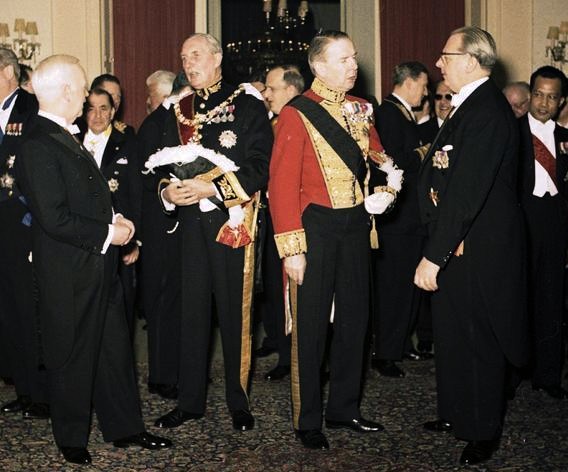|
Party Favor
A party favor is a small gift given to the guests at a party as a gesture of thanks for their attendance, a memento of the occasion, or simply for fun. History While the term "party favor" is modern, the practice dates back to the classical Graeco-Roman tradition, where food or flowers were gifted to the attendees of an event. In the Middle Ages entertainers were throwing small objects at the spectators, and the elaborate table decorations were sometimes gifted to important guests after the party. The origins of elaborate party favors at the weddings can probably be traced to the 20th-century marriage of Victor Emmanuel of Savoy to Elena of Montenegro, where the guests received silver items of significant value. The tradition of sharing a wedding cake also represents gifting food to ensure good life and prosperity. The almost extinct in Britain, but revived in the US, tradition of the groom's cake involved boxing its pieces to be given away to the guests. Wedding tradi ... [...More Info...] [...Related Items...] OR: [Wikipedia] [Google] [Baidu] |
Party
A party is a gathering of people who have been invited by a Hospitality, host for the purposes of socializing, conversation, recreation, or as part of a festival or other commemoration or celebration of a special occasion. A party will often feature food and beverages, and often conversation, music, dancing, or other forms of entertainment. Some parties are held in honor of a specific person, day, or event, such as a birthday party, a Super Bowl party, or a St. Patrick's Day party. Parties of this kind are often called celebrations. A party is not necessarily a private occasion. Public parties are sometimes held in restaurants, Public house, pubs, beer gardens, nightclubs, or Bar (establishment), bars, and people attending such parties may be charged an admission fee by the host. Large parties in public streets may celebrate events such as Mardi Gras or the signing of a peace treaty ending a long war. Types Balls Banquets Birthday party A birthday party is a celeb ... [...More Info...] [...Related Items...] OR: [Wikipedia] [Google] [Baidu] |
Table Setting
Table setting (laying a Table (furniture), table) or place setting refers to the way to set a table with tableware—such as eating utensils and for serving and eating. The arrangement for a single diner is called a place setting. It is also the layout in which the utensils and ornaments are positioned. The practice of dictating the precise arrangement of tableware has varied across cultures and historical periods. Place setting Informal settings generally have fewer utensils and dishes but use a layout based on more formal settings. food utensil, Utensils are arranged in the order and according to the manner in which the diner will use them. In the Western world, West, forks, plate, butter knife, and napkin generally are placed to the left of the dinner plate, and knife, knives, spoons, drinkware, stemware and tumblers, Teacup, cups, and saucers to the right. (By contrast, formal settings in Armenia place the fork to the right of the dinner plate and informal settings in Turke ... [...More Info...] [...Related Items...] OR: [Wikipedia] [Google] [Baidu] |
Bomboniere
A bomboniere (), singular "bomboniera", (; Italian, from French ''bonbonnière'', a box containing " bonbons") is a kind of fragrant-smelling party favor given out on special occasions such as weddings, baptism, First Communion or Confirmation. It usually consists of five Jordan almonds in a festive bag, with the almonds symbolizing health, wealth, happiness, fertility and long life. The bag is typically made of tulle or satin and tied with ribbons. The almonds are white for a wedding, First Communion or Confirmation; pink or light-blue for the birthday or baptism of a girl or boy; red for a graduation; and silver or gold for 25 or 50 year anniversaries. Often they are adorned with dried natural flowers or artificial flowers made of silk or paper. The bag is often given stored inside a small vessel made of silver, crystal or porcelain. In Australia, a bomboniere is party favor given out at weddings, first holy communions and the like. Such gifts may take the form of a wine b ... [...More Info...] [...Related Items...] OR: [Wikipedia] [Google] [Baidu] |
Gratitude
Gratitude, thankfulness, or gratefulness is a feeling of appreciation (or similar positive response) by a recipient of another's kindness. This kindness can be gifts, help, favors, or another form of generosity to another person. The word comes from the Latin word , which means "pleasing" or "thankful". The absence of gratitude where gratitude is expected is called ingratitude or ungratefulness. Gratitude has been a part of several world religions. It also has been a topic of interest to ancient, medieval, and modern philosophy, philosophers. The discipline of psychology attempts to understand the short term experience of gratitude (state gratitude), individual differences in how frequently gratitude is felt (trait theory, trait gratitude), the relationship between these two, and the therapeutic benefits of gratitude. Philosophical approaches Gratitude is a topic of interest in the philosophical disciplines of normative ethics, applied ethics, and political philosophy, as we ... [...More Info...] [...Related Items...] OR: [Wikipedia] [Google] [Baidu] |
Gift
A gift or present is an item given to someone (who is not already the owner) without the expectation of payment or anything in return. Although gift-giving might involve an expectation of reciprocity, a gift is intended to be free. In many countries, the act of mutually exchanging money, goods, etc., may sustain social relationships and contribute to social cohesion. Economists have elaborated the economics of gift-giving into the notion of a gift economy. By extension, the term ''gift'' can refer to any item or act of service that makes the other happier or less sad, especially as a favor, including forgiveness and kindness. Gifts are often presented on occasions such as birthdays and holidays. History Gift-giving has played a central role in social and economic systems throughout human history. Anthropologist Marcel Mauss argued in '' The Gift'' (1925) that gifts in archaic societies were embedded in systems of obligation, where the act of giving, receiving, and recip ... [...More Info...] [...Related Items...] OR: [Wikipedia] [Google] [Baidu] |
Rustic Wedding Favour , a formal Roman script
{{disambig ...
Rustic may refer to: *Rural area *Pastoral Architecture * Rustication (architecture), a masonry technique mainly employed in Renaissance architecture * Rustic architecture, an informal architectural style in the United States and Canada with several variations Zoology * Rustic moths, various noctuid moths of subfamilies Hadeninae and Noctuinae, including ** The rustic, ('' Hoplodrina blanda'', Hadeninae) * The rustic ('' Cupha erymanthis''), a brush-footed butterfly * Rustic sphinx ('' Manduca rustica''), a hawkmoth Other uses * Rustic, Toronto, a neighbourhood in Toronto, Ontario, Canada * Rustic capitals Rustic capitals () is an ancient Roman calligraphic script. Because the term is negatively connoted supposing an opposition to the more 'civilized' form of the Roman square capitals, Bernhard Bischoff prefers to call the script ''canonized capi ... [...More Info...] [...Related Items...] OR: [Wikipedia] [Google] [Baidu] |
Naming Ceremony
A naming ceremony is a stage at which a person or persons is officially assigned a name. The methods of the practice differ over cultures and religions. The timing at which a name is assigned can vary from some days after birth to several months or many years. In religions and cultures Christianity Naming a child, popularly referred to as "Christening", is usually through the baptism ceremony in Christianity, especially Catholic culture, and to a lesser degree among those Protestantism, Protestants who practice infant baptism. In Eastern Orthodoxy infants are traditionally named on the eighth day of life in a special service conducted either in the home or in church. Often, Christians will adhere to local traditions of the land in which they were born. For example, in Kerala, the traditional Hinduism, Hindu custom of tying an aranjanam is followed even in Christian families. In the Church of Jesus Christ of Latter-day Saints infants are traditionally given a name and a bless ... [...More Info...] [...Related Items...] OR: [Wikipedia] [Google] [Baidu] |
Bar/Bat Mitzvah
A ''bar mitzvah'' () or ''bat mitzvah'' () is a coming of age ritual in Judaism. According to Jewish law, before children reach a certain age, the parents are responsible for their child's actions. Once Jewish children reach that age, they are said to "become" ''b'nai mitzvah'', at which point they begin to be held accountable for their own actions. Traditionally, the father of a ''bar'' or ''bat mitzvah'' offers thanks to God that he is no longer punished for his child's sins. In Orthodox communities, boys become ''bar mitzvah'' at 13 and girls become ''bat mitzvah'' at 12. In most Reform, Reconstructionist, and Conservative communities, the milestone is 13 regardless of gender. After this point, children are also held responsible for knowing Jewish ritual law, tradition, and ethics, and are able to participate in all areas of Jewish community life to the same extent as adults. In some Jewish communities, men's and women's roles differ in certain respects. For example, in ... [...More Info...] [...Related Items...] OR: [Wikipedia] [Google] [Baidu] |
Baby Shower
A baby shower is a party to celebrate the Childbirth, delivery or Pregnancy, expected birth of a child. Practices vary greatly by culture, but it is often a rite of passage that celebrates through Gift, giving gifts and spending time together. While the term ''baby shower'' is commonly associated with US traditions, similar traditions exist across cultures. Etymology The term ''shower'' is often assumed to mean that the expectant parent is "showered" with gifts. A related event, called a bridal shower, may have derived its name from the custom in the 19th century for the presents to be put inside a parasol, which when opened would "shower" the bride-to-be with gifts. Description Traditionally, baby showers are given only for the family's first child, and only women are invited to party, though this has changed in recent years, with baby showers being mixed-sex or taking place in the workplace. Smaller showers, or showers in which guests are encouraged to give only diapers or ... [...More Info...] [...Related Items...] OR: [Wikipedia] [Google] [Baidu] |
Formal Occasion
Formal wear or full dress is the Western dress code category applicable for the most formal occasions, such as weddings, christenings, confirmations, funerals, Easter and Christmas traditions, in addition to certain state dinners, audiences, balls, and horse racing events. When formal dress is required, generally permitted alternatives include the most formal versions of ceremonial dresses (including court dresses, diplomatic uniforms and academic dresses), full dress uniforms, religious clothing, national costumes, and most rarely frock coats (which preceded morning coat as default formal day wear 1820s-1920s). In addition, formal wear is often properly worn when displaying official full size orders and medals. The protocol specifying men's traditional formal wear has remained virtually unchanged since the early 20th century. Despite decline following the counterculture of the 1960s, it remains observed in formal settings influenced by Western culture: notably around Europe, ... [...More Info...] [...Related Items...] OR: [Wikipedia] [Google] [Baidu] |
Christmas
Christmas is an annual festival commemorating Nativity of Jesus, the birth of Jesus Christ, observed primarily on December 25 as a Religion, religious and Culture, cultural celebration among billions of people Observance of Christmas by country, around the world. A liturgical year, liturgical feast central to Christianity, Christmas preparation begins on the Advent Sunday, First Sunday of Advent and it is followed by Christmastide, which historically in the West lasts Twelve Days of Christmas, twelve days and culminates on Twelfth Night (holiday), Twelfth Night. Christmas Day is a public holiday in List of holidays by country, many countries, is observed religiously by a majority of Christians, as well as celebrated culturally by many non-Christians, and forms an integral part of the annual Christmas and holiday season, holiday season. The traditional Christmas narrative recounted in the New Testament, known as the Nativity of Jesus, says that Jesus was born in Bethlehem, in ... [...More Info...] [...Related Items...] OR: [Wikipedia] [Google] [Baidu] |
Birthdays
A birthday is the anniversary of the birth of a person or figuratively of an institution. Birthdays of people are celebrated in numerous cultures, often with birthday gifts, birthday cards, a birthday party, or a rite of passage. Many religions celebrate the birth of their founders or religious figures with special holidays (e.g. Christmas, Mawlid, Buddha's Birthday, Krishna Janmashtami, and Gurpurb). There is a distinction between birth''day'' and birth''date'' (also known as date of birth): the former, except for February 29, occurs each year (e.g. January 15), while the latter is the complete date when a person was born (e.g. January 15, 2001). Coming of age In most legal systems, one becomes a legal adult on a particular birthday when they reach the age of majority (usually between 12 and 21), and reaching age-specific milestones confers particular rights and responsibilities. At certain ages, one may become eligible to leave full-time education, become subject to milit ... [...More Info...] [...Related Items...] OR: [Wikipedia] [Google] [Baidu] |








